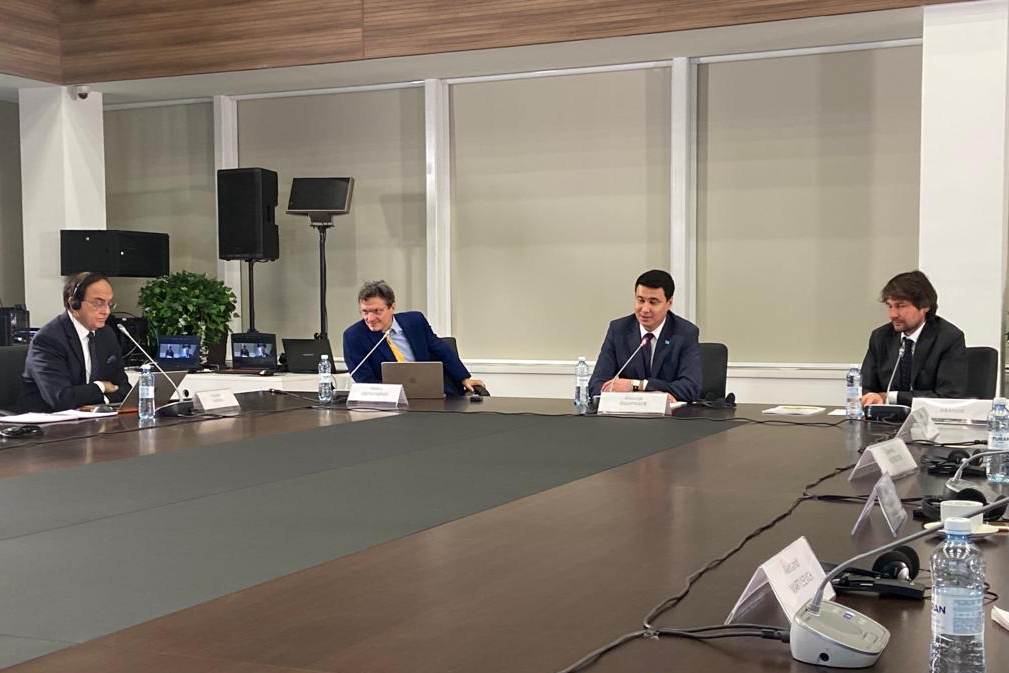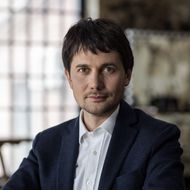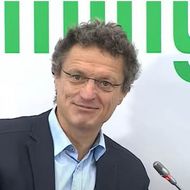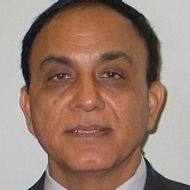Experts from HSE University Explore Prospects for Carbon Farming in Kazakhstan
HSE University’s International BRICS Competition Law and Policy Centre and the university’s Centre for Technology Transfer, together with the International Institute for Applied Systems Analysis (IIASA, Vienna), have released a draft version of the research report ‘The Carbon Farming Industry in Kazakhstan: Unlocking Opportunities.’ Experts from the UN Convention to Combat Desertification and the Kazakhstan-based TALAP Centre for Applied Research also took part in the project.
The report explores the positive effects of deploying carbon farming methods in regions with semi-arid and arid climates, using Kazakhstan as an example. The main problems of agriculture in such regions are moisture deficiency and loss of soil organic matter (humus), which affects the soil’s health and its ability to perform its functions. Illustrative examples in Kazakhstan include the virgin regions in the north of the country and the Aral Sea region in the southwest.
Large-scale projects in the second half of the 20th century had a negative impact on the vulnerable ecosystems of Kazakhstan and their biological resources: the development of virgin lands in the north, the construction of irrigation systems and hydroelectric power stations, and mining in the south.
Reducing current emissions is key to mitigating global warming. However, emission reduction alone is not enough to keep the planet’s average surface temperature from rising by 1.5°C or even 2°C. Firstly, not all emissions can be reduced to zero. Secondly, in order to stabilise the temperature at acceptable levels, it is necessary to remove some of the existing greenhouse gases from the atmosphere and place them for permanent (long-term) storage in another reservoir.
In this regard, the steppes and semi-deserts of Kazakhstan are of particular value as a capacious carbon sink. Current estimates indicate that terrestrial ecosystems absorb about a third of annual anthropogenic carbon dioxide emissions: they contain 2.5 times more carbon than the atmosphere. At the same time, soils store 2.5 times more carbon than plant biomass; while meadows and pastures, at elevated levels of CO2 in the atmosphere, sequester carbon into the soil more efficiently than forests.
Carbon farming refers to agroforestry management practices aimed at preventing carbon loss and increasing carbon sequestration in natural and managed ecosystems.
By increasing the efficiency of terrestrial ecosystems as a major carbon sink, carbon farming allows for the simultaneous solution of two problems: reducing the concentration of greenhouse gases in the atmosphere and improving soil health and functional properties.
Experts have come to the conclusion that government support will play a key role in the widespread introduction of carbon farming methods in Kazakhstan at the first stage. Although carbon markets can be a significant source of additional income, government funding will provide the necessary stability to the carbon farming programme. The opportunity to attract international investment, which can serve not only as a financing tool but also as a means of obtaining the necessary knowledge and technology in this area, deserves special attention.

The main incentive mechanism may be the possibility of implementing carbon offsets, ie units of absorption or reduction of emissions generated as a result of the transition to natural sequestration technologies.
The potential of the Eurasian steppes as a carbon sink is comparable to the similar potential of the Amazon rainforest; this can be used as a key factor in the country’s positioning within the global climate agenda and as a potential source of additional funding for Kazakhstan’s climate policy.

Alexey Ivanov, Director of BRICS Antimonopoly Centre and Academic Supervisor of HSE University’s Centre for Technology Transfer
‘The reason for the increasing relevance of carbon farming lies in the fact that it is one of the few ways to reduce environmental impact without having to reduce economic activity and, therefore, without socio-economic risks. Within a few years, carbon projects, both Russian and Kazakh, will be able to be traded on Chinese exchanges, and we must be prepared for this. Now, HSE University, the All-Russian Fodder Research Institute named after V. R. Williams, and Uralchem have launched the Pokrovsky carbon test site—to date, this is the only project that fully concentrates on meadow and pasture ecosystems. The technologies being developed at Pokrovsky are already in demand among our Kazakh colleagues: Kazakh activists, inspired by our experience, created the first carbon fibre test site in Pavlodar, covering ten thousand hectares. If, with support from Kazakhstan’s Ministry of Ecology and Natural Resources, a comprehensive programme for the development of carbon agriculture is implemented in the country, a project for soil reclamation at the Semipalatinsk test site spanning 1.8 million hectares can be launched with our participation. These lands are unsuitable for food production, but can be used for carbon agriculture. In addition, there are great prospects for expanding the geography of cooperation: today we have launched technology transfer to Kazakhstan; in the future, Iran, India, China, Saudi Arabia, Egypt, and other BRICS countries may become our partners.’

Michael Obersteiner, Director of the Environmental Change Institute, University of Oxford, and Senior Fellow at IIASA
‘The volume of voluntary carbon markets in the world has reached almost two billion dollars, and multifold growth is expected in the coming decades. Australia, the UK, the EU, the USA, and China have already launched their own projects for the production of carbon units. The OECD estimates that to achieve net-zero emissions by 2050, a carbon price would need to be 147 dollars per tonne of CO2 equivalent by 2030. At the same time, the potential for absorption/reduction of emissions on cultivated lands in Kazakhstan is estimated at up to 35 million tonnes of CO2 equivalent per year. We are talking about billions of dollars in income for the agricultural sector, which is important from the viewpoint of improving the welfare of farmers, who are generally in a more vulnerable position than urban residents. Kazakhstan’s future experience in introducing carbon farming and carbon sequestration technologies can be scaled up to the Asian dry belt region. Kazakhstan’s programme can become an example for other countries looking for ways to achieve their climate goals.’

Pradeep Monga, Senior Advisor, International Institute for Applied Systems Analysis (IIASA), Former Deputy Executive Secretary of the UN Convention to Combat Desertification
‘The report can serve as a basis for the implementation of a large programme on carbon farming with international cooperation. It is time to ask the Global Environment Facility (GEF) and the Green Climate Fund to sponsor the next phase of the study to begin work on the roadmap, build capacity, and engage the farming community.’
Over the past few years, HSE University has been actively engaged in research in the field of natural sequestration technologies. During this time, two reports have been prepared on the potential of carbon agriculture for Russia. At the end of 2022, HSE University became the operator of Pokrovsky specialised carbon agricultural test site in the Moscow, Kaluga, and Kirov regions, whose main task is to monitor greenhouse gas flows in the ecosystems under study to assess their carbon balance.
See also:
HSE University Holds HSE CS × BRICS Ideathon
On November 9, 2025, the HSE CS × BRICS Ideathon—a large-scale intensive event for students aimed at developing international project skills and finding solutions to current challenges facing BRICS countries—took place at HSE University’s Pokrovsky Bulvar campus. The event was organised by the Multilateral Strategic Projects Office with the support of the BRICS Expert Council–Russia , the Faculty of Computer Science (FCS), and the HSE FCS Hackathon Club
‘To Help Make the World More Sustainable, Fair, and Humane’
The BRICS International School: New Generation has concluded at HSE University, bringing together more than 100 participants from 38 BRICS and Global South countries. The attendees included early-career researchers, diplomats, entrepreneurs, journalists, and civil society representatives.
‘Regulators Must Understand That Absolute Predictability is Unattainable’
On October 10–11, 2025, the BRICS Competition Law and Policy Centre at HSE University (the BRICS Centre) hosted a two-day international seminar, ‘Platform Economy: Competition Law and the Market Power of Digital Platforms,’ in Tashkent, Uzbekistan. The event brought together competition authorities from BRICS+ nations and leading antitrust experts from around the world.
Achieving Financial Independence: Experts Discuss Development of BRICS National Currency Settlements
How can BRICS countries move away from the dollar in international settlements, and what can they do to advance this goal today? These questions were discussed by experts during a round table at HSE University. The event was organised by the Multilateral Strategic Projects Office together with the HSE Faculty of World Economy and International Affairs as part of HSE’s activities within the BRICS Network University and the Joint Basic Research Projects ‘International Academic Cooperation of HSE University.’
Experts from HSE University and BRICS Anti-Monopoly Authorities Analyse Global Grain Market
The International BRICS Competition Law and Policy Centre at HSE University presented the scientific report ‘From Fields to Futures: Competition, Financialisation, and Digitalisation in Global Grain Value Chains.’ The document was prepared as part of expert support from the BRICS Working Group on Competition Research in Food Markets. The presentation took place at the academic conference ‘Emerging Challenges of Competition Law and Policy in the BRICS and Beyond’ on September 12, 2025, in Cape Town (South Africa), which the BRICS Centre organised together with the University of Cape Town on the sidelines of the 9th BRICS International Competition Conference.
HSE Launches Training for Future BRICS Experts
From August 20–23, 2025, the Artek International Children’s Centre (Crimea, Russia) hosted an off-site session of HSE University’s educational and outreach project BRICS International School: New Generation. The school was the first event to take place under the cooperation agreement signed this year between HSE University and Artek.
HSE University and University of Campinas Join Forces to Build Alternative Financial System
HSE University and the University of Campinas (UNICAMP, Brazil) have announced the launch of a major joint research project to develop new approaches to an alternative international financial system. The initiative, which brings together leading experts in global economics and finance, seeks to analyse the current state of international financial architecture and explore ways of transforming it in the context of a changing geopolitical landscape.
HSE University to Host BRICS International School: New Generation
Registration for the BRICS International School: New Generation, one of the leading international educational projects aimed at prospective leaders interested in the agenda of global development and cooperation within the framework of BRICS, has opened.
Experts Assess How BRICS Countries’ Education Systems Are Evolving
The BRICS Expert Council–Russia, based at HSE University and operating in collaboration with the HSE Institute of Education, has released an analytical report titled ‘The Transformation of General Education in BRICS Countries.’ The study explores how BRICS nations are addressing shared challenges, including equitable access to schooling, digital integration, support for inclusion, linguistic diversity, and intercultural dialogue.
‘Artificial Intelligence Has Become the Lifeblood of the Global Economy’
Experts from HSE University took part in the BRICS Academic Forum (FABRICS) held in the capital of Brazil this year. The main theme of the event was to discuss cooperation among countries in the Global South amid geopolitical turbulence and rapid technological change. Academics and experts from BRICS member states and partner nations explored topics such as global healthcare, AI technologies, trade, climate change, and reform of the multilateral global security and governance architecture.


